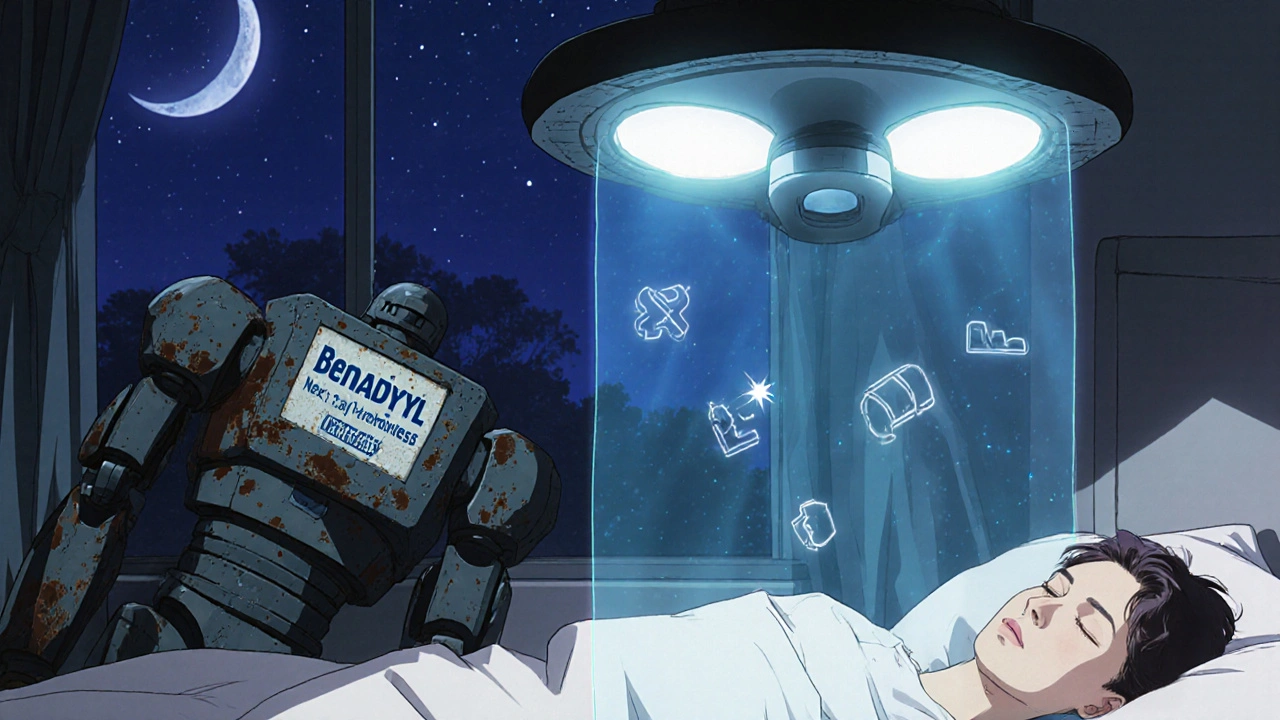If you’ve ever lain awake at night because your nose is stuffed, your eyes are itchy, and your throat feels like it’s crawling with pollen, you know how allergies can wreck your sleep. You might be taking desloratadine to calm the sneezing and runny nose, but you’re wondering: does it help you actually sleep? Or does it keep you up like some other antihistamines do?
What desloratadine actually does
Desloratadine is a second-generation antihistamine. It’s the active metabolite of loratadine, meaning your body turns loratadine into desloratadine to make it work better. It blocks histamine - the chemical your body releases when it thinks pollen, dust, or pet dander is an invader. Less histamine means less swelling, less mucus, less itching. That’s why it’s used for allergic rhinitis and chronic hives.
Unlike first-gen antihistamines like diphenhydramine (Benadryl) or chlorpheniramine, desloratadine doesn’t cross the blood-brain barrier easily. That’s the key difference. First-gen drugs make you drowsy because they hit histamine receptors in your brain that control wakefulness. Desloratadine? Not so much.
Does desloratadine make you sleepy?
The short answer: rarely.
In clinical trials, less than 2% of people taking desloratadine reported drowsiness - the same rate as those taking a placebo. That’s not just "not very common." That’s "so unlikely you shouldn’t plan for it." The U.S. Food and Drug Administration (FDA) and the European Medicines Agency (EMA) both classify it as a non-sedating antihistamine. In fact, the manufacturer’s own studies show that people taking desloratadine performed just as well on reaction time and memory tests as those who took nothing.
So if you’re taking it for allergies and worried it’ll knock you out during the day, you’re safe. But here’s the twist: if your insomnia is caused by allergy symptoms - sneezing fits, nasal congestion, itchy eyes - then desloratadine might help you sleep indirectly. It doesn’t sedate you. It removes the reason you can’t sleep.
How allergies sabotage sleep
It’s not just about being itchy. Allergies mess with your breathing. Nasal congestion forces you to breathe through your mouth, which dries out your throat and can trigger snoring or even sleep apnea. Postnasal drip makes you cough at night. Eye itching wakes you up. And when you’re tossing and turning for an hour before bed, your body starts associating bedtime with discomfort, not rest.
A 2023 study in the Journal of Allergy and Clinical Immunology tracked 412 adults with seasonal allergies. Those who had moderate to severe nasal congestion were 3.5 times more likely to report poor sleep quality. When they started taking a non-sedating antihistamine like desloratadine, their sleep scores improved by 40% - not because they felt sleepy, but because they could breathe.

Desloratadine vs. other allergy meds for sleep
Let’s compare what actually works for sleep when allergies are the culprit.
| Medication | Sedating? | Helps with nasal congestion? | Improves sleep quality? | Next-day drowsiness? |
|---|---|---|---|---|
| Desloratadine | No | Moderate | Yes (indirectly) | Very low |
| Loratadine (Claritin) | No | Moderate | Yes (indirectly) | Very low |
| Cetirizine (Zyrtec) | Mild (in ~14% of users) | Good | Yes | Low to moderate |
| Diphenhydramine (Benadryl) | Yes | Good | Yes (short-term) | High |
| Nasal corticosteroid spray (e.g., Flonase) | No | Excellent | Yes (best for congestion) | Negligible |
Notice something? The most effective option for sleep isn’t even an oral antihistamine. Nasal steroid sprays like fluticasone or mometasone reduce swelling deep inside your nose. They take days to work, but once they do, they’re the gold standard for breathing at night. Desloratadine works faster - usually within an hour - but doesn’t touch congestion as deeply.
When desloratadine won’t fix your sleep
It’s not a magic pill. If your insomnia isn’t caused by allergy symptoms, desloratadine won’t help. If you’re stressed, anxious, using screens before bed, or have sleep apnea, blocking histamine won’t solve it. In fact, if you’re taking it just to fall asleep, you’re using the wrong tool.
Some people think, "I took Benadryl last night and slept like a log," and assume all antihistamines work that way. But Benadryl’s sleep effect is a side effect - and a bad one. It fragments your sleep architecture. You might fall asleep fast, but you miss deep sleep and REM. You wake up groggy, your memory feels fuzzy, and your body doesn’t recover. That’s not rest. That’s chemical sedation.
How to use desloratadine for better sleep
Here’s what actually works if allergies are keeping you up:
- Take desloratadine once daily, at the same time - usually in the morning. It lasts 24 hours. No need to take it at night.
- Pair it with a nasal steroid spray. Use it every night, even if you feel fine. It builds up over 3-5 days.
- Wash your sheets weekly in hot water. Dust mites are the #1 indoor allergen.
- Keep windows closed during high pollen season. Use an air purifier with a HEPA filter in your bedroom.
- Shower before bed. Rinse pollen off your hair and skin.
If you’re still struggling after 7-10 days of this routine, talk to your doctor. You might need a different approach - like a leukotriene blocker (montelukast) or allergy shots.

What to avoid
Don’t combine desloratadine with alcohol. Even though it’s non-sedating, alcohol can amplify drowsiness in some people. Don’t double up on antihistamines. Many cold and flu meds contain cetirizine or loratadine. Taking extra could lead to side effects like dry mouth, headache, or even rapid heartbeat.
And please - don’t use desloratadine as a sleep aid. It’s not designed for that. If you’re relying on any medication to fall asleep, you’re masking a deeper problem. Sleep isn’t a switch you flip with a pill. It’s a process your body needs to restore naturally.
The bottom line
Desloratadine won’t make you sleepy. But if your insomnia is caused by sneezing, sniffling, or itchy eyes, it can give you back your nights - not by knocking you out, but by removing the barriers to sleep. It’s not the strongest tool for congestion, but it’s clean, reliable, and safe for daily use. For most people with allergic insomnia, pairing it with nasal sprays and good sleep hygiene is the real winning combo.
Don’t reach for the drowsy antihistamine. Don’t assume all allergy meds are the same. Your body’s already working hard to fight allergens. Let desloratadine do its job - clear the noise - and let your natural sleep take over.
Can desloratadine cause insomnia?
No, desloratadine doesn’t cause insomnia. In fact, it usually helps by reducing allergy symptoms that disrupt sleep. Some people report mild side effects like dry mouth or headache, but these rarely interfere with sleep. If you’re having trouble sleeping after starting desloratadine, look elsewhere - stress, caffeine, or environmental allergens are more likely culprits.
Is desloratadine better than Zyrtec for sleep?
It depends. Desloratadine is less likely to cause drowsiness than cetirizine (Zyrtec), which affects about 1 in 7 users. If you want zero next-day grogginess, desloratadine wins. But if you have severe congestion and don’t mind a little sleepiness, Zyrtec might work faster for symptom relief. Neither is a sleep aid - both just remove allergy barriers to sleep.
How long does it take for desloratadine to improve sleep?
You’ll usually feel relief from sneezing and itching within 1-3 hours. But improved sleep often takes 2-5 days, especially if nasal congestion is the main issue. That’s because swelling in your nasal passages doesn’t shrink instantly. Pair it with a steroid spray for faster results.
Can I take desloratadine at night?
You can, but there’s no benefit. Desloratadine lasts 24 hours, so taking it in the morning gives you full coverage through the night. Taking it at night won’t make you sleep better - and if you forget in the morning, you’ll still be covered. Stick to one daily dose, whenever it’s easiest to remember.
Is desloratadine safe for long-term use?
Yes. Studies have shown desloratadine is safe for daily use for up to 12 months, and many people use it seasonally for years. It doesn’t cause tolerance, dependence, or rebound congestion. Unlike decongestants, it won’t make your symptoms worse over time. Always follow your doctor’s advice, but long-term use is well-supported by clinical data.
Next steps if sleep doesn’t improve
If you’ve been taking desloratadine daily for 10 days, cleaned your bedroom, used a nasal spray, and still can’t sleep - it’s time to dig deeper. Allergies aren’t always the only problem. Sleep apnea, acid reflux, anxiety, or even a bedroom that’s too warm can be the real culprit.
Keep a sleep diary for a week: note when you go to bed, how long it takes to fall asleep, how many times you wake up, and what your symptoms were. Bring it to your doctor. They might recommend a sleep study or refer you to an allergist for testing. You don’t have to live with sleepless nights. There’s a solution - you just need the right combination.


Evan Brady
November 20, 2025 AT 01:02Desloratadine is a beautiful example of pharmacological elegance-non-sedating, targeted, and clean. It doesn’t brute-force sleep like Benadryl’s nuclear option. It removes the *noise*-the histamine chaos-so your brain can finally shut off the alarm bells and let circadian rhythm do its job. This isn’t sedation. This is restoration. And honestly? Most people don’t even realize their sleep issues are allergy-driven until they try this. Game-changer for allergic insomnia.
mithun mohanta
November 20, 2025 AT 03:46Let’s be real-this is peak ‘pharma-bro’ content. 🤡 You’re acting like desloratadine is some mystical elixir from the halls of Harvard Med. It’s just a metabolite. A *second-gen* one. Big whoop. Meanwhile, people in rural India are still using neem oil and steam inhalation because they can’t afford your $40/month ‘non-sedating’ luxury. Also-HEPA filters? In a Mumbai apartment with 12 people and open windows? 😂
Ram tech
November 21, 2025 AT 04:28meh. i took zyrtec last week and slept like a rock. desloratadine? who cares. my nose still stuffs. maybe its just me. or maybe the article is overhyped. 🤷♂️
Jenny Lee
November 21, 2025 AT 23:24YES. This is the vibe. 🙌 Stop reaching for the sleepy pills. Clear the blockage, not your brain. You’re not broken-you’re just allergic. 💪
Ancel Fortuin
November 22, 2025 AT 12:13Non-sedating? LOL. Big Pharma’s PR stunt. They’ve been hiding the truth for decades. Desloratadine doesn’t cross the BBB? Sure. But what about the micro-doses of aluminum adjuvants in the filler? Or the fact that all antihistamines are just delaying immune recognition? Your ‘sleep improvement’? That’s just your body’s stress response going into shock from chemical suppression. Wake up. 🌑
Emily Entwistle
November 22, 2025 AT 22:56I used to take Benadryl every night like it was candy 😴 Now I take desloratadine + Flonase and actually WAKE UP refreshed?? 🤯 Life changed. Also, washing sheets in hot water? YES. Dust mites are tiny monsters. 👻
deepak kumar
November 23, 2025 AT 13:33As someone from Delhi, I can confirm: allergies wreck sleep here like nothing else. The air? Thick with pollution + pollen + diesel particulates. Desloratadine isn’t magic, but it’s the only thing that lets me breathe without a nasal spray in my face. My cousin tried Zyrtec-woke up groggy, missed work. I stick with desloratadine. Morning dose. No drama. Also, shower before bed? Absolute game-changer. Pollen sticks to hair like glue.
kim pu
November 25, 2025 AT 13:27Okay but why are we all acting like this is some revolutionary breakthrough? Like… it’s a *second-gen* antihistamine. We’ve known since the 90s that these don’t sedate. Meanwhile, people are still taking diphenhydramine like it’s a nightly ritual. We need a public health PSA. Not a 2000-word essay. 🙄
Dave Pritchard
November 27, 2025 AT 02:13Hey, if you’re still struggling after 10 days of this routine-don’t beat yourself up. Sleep is complicated. Maybe your pillow is old. Maybe your room’s too warm. Maybe you’re scrolling at 1 a.m. and your brain thinks it’s 2009. Try a white noise app. Try lowering the temp. Desloratadine clears the path-but you’ve gotta walk it. You got this. 💛
Jeff Hakojarvi
November 27, 2025 AT 13:28I used to think I had insomnia until I realized my nose was clogged 90% of the night. I started taking desloratadine in the morning + flonase at night. Took 4 days. Then-oh my god-I slept 7 hours straight. No alarms. No tossing. Just… rest. I didn’t even know I’d been breathing through my mouth. My wife said I stopped snoring. I cried. This isn’t just medicine-it’s dignity.
Samkelo Bodwana
November 28, 2025 AT 01:44I appreciate the nuance here. Too many people treat allergies like a nuisance you just ‘power through.’ But when your breathing’s compromised, sleep isn’t a choice-it’s a negotiation with your body. Desloratadine doesn’t sedate, but it does *unblock*. And that’s profound. I’ve seen patients on steroids, antihistamines, even OTC melatonin-but nothing works until you address the nasal inflammation. The real hero here isn’t the drug-it’s the awareness. We need more posts like this. Not just facts, but context.
Ronald Stenger
November 28, 2025 AT 06:21Non-sedating? Please. All these ‘new’ antihistamines are just rebranded corporate junk. The FDA approves anything if the pharma lobby pays enough. And don’t get me started on ‘HEPA filters’-they’re a scam for rich white folks. Real Americans use duct tape and a fan. Also, why are you telling people to shower before bed? Are you a spa influencer? 🤨
benedict nwokedi
November 28, 2025 AT 21:09Let’s not pretend this is science. Desloratadine’s ‘non-sedating’ label is a regulatory loophole. The trials were conducted on healthy college students in climate-controlled labs. What about the 70-year-old with COPD? The single mom working three jobs? The guy sleeping in a trailer with mold? You’re prescribing privilege disguised as medicine. And now you want us to buy HEPA filters? That’s not healthcare-that’s consumerism with a lab coat. 🚩